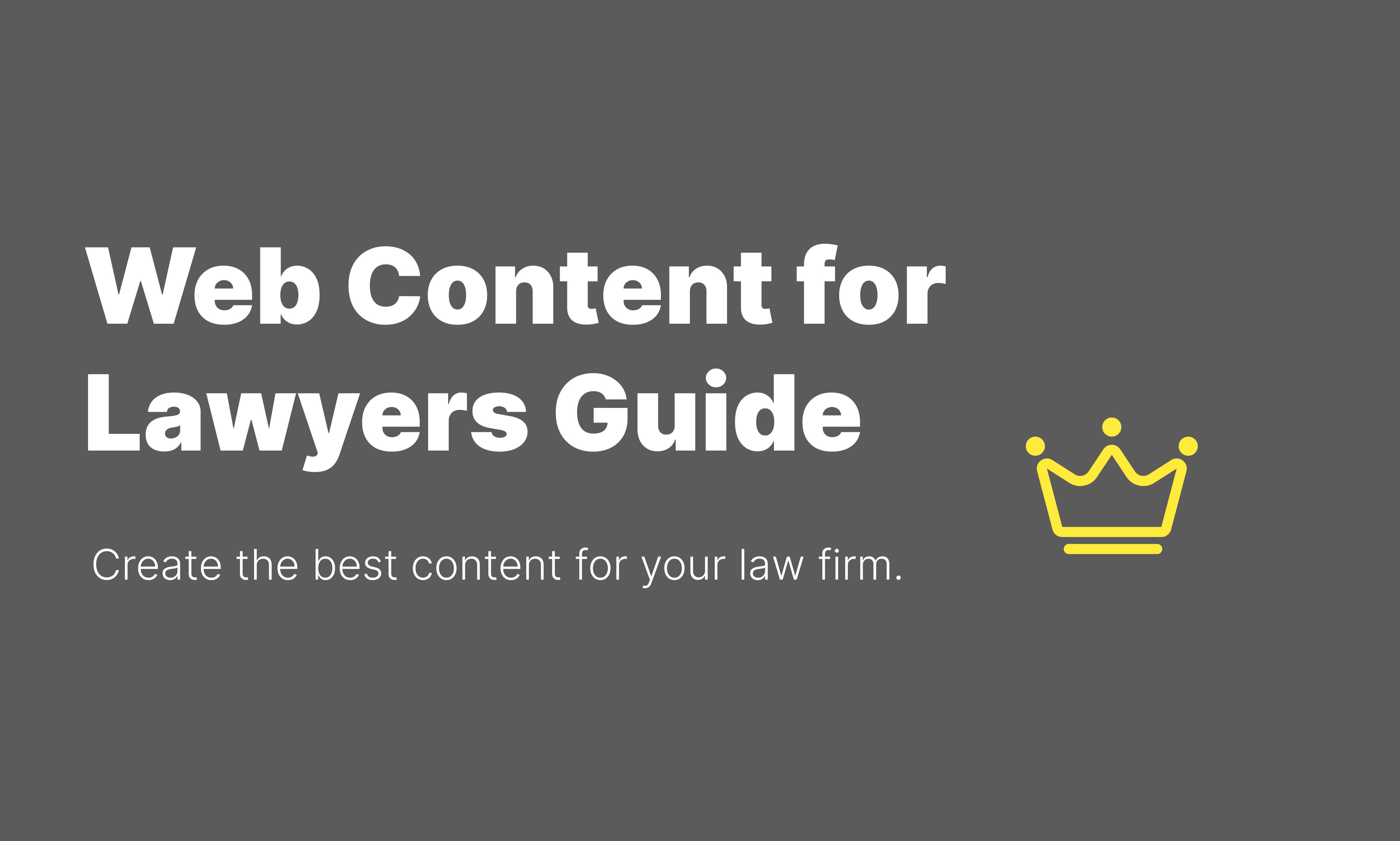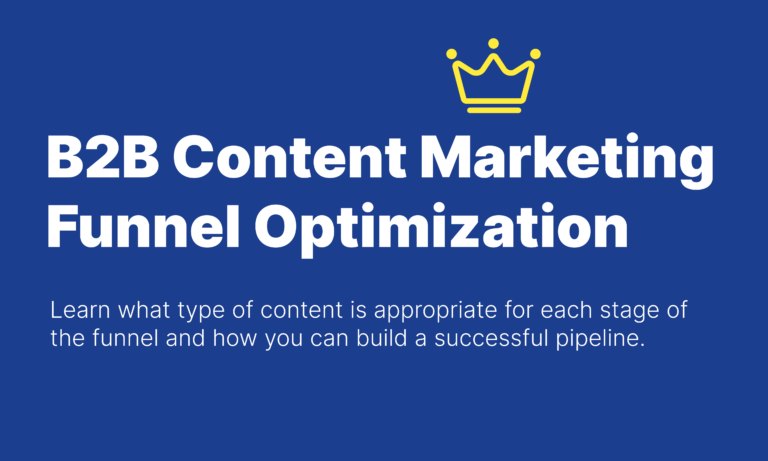Web Content for Lawyers: How to Do It Right

Web content plays a pivotal role in establishing a firm’s credibility, expertise, and accessibility. This guide will dive deep into the key aspects of creating effective web content for lawyers, from understanding your audience to optimizing for search engines.
Key Takeaways
- Understand Your Target Audience: Define your ideal client and tailor your messaging to their specific needs.
- Optimize for Search Engines: Conduct keyword research and incorporate relevant keywords into your website content for lawyers.
- Create High-Quality Web Content: Produce valuable, informative, and engaging web content that addresses your target audience’s needs.
- Prioritize User Experience: Ensure your website is mobile-friendly, easy to navigate, and visually appealing.
- Adhere to Legal Considerations: Comply with attorney advertising rules, data protection laws, and accessibility standards.
- Leverage Social Media: Utilize social media platforms to connect with potential clients, other lawyers, build brand awareness, and promote your services.
- Track and Analyze Performance: Use analytics tools to measure your website’s performance and identify areas for improvement.
What is Web Content for Lawyers?
Web content for lawyers is the written or visual material that is used to inform, educate, and persuade potential clients about a law firm’s services. It is an essential component of a law firm’s online presence and can help attract new clients, build credibility, and establish the firm as an expert in its field.
Now let’s look at the things you need to do to have a profitable legal web content strategy for your law firm.

Signup for our newsletter
Enter your email below to get the best SaaS, AI, and Marketing insights in your inbox.
Understanding Your Target Audience
Before crafting any web content marketing strategy, consider factors such as:
Defining Your Ideal Client
To create effective web content for lawyers, it’s essential to have a clear understanding of your target audience. This goes beyond general demographics like age, gender, and location. By identifying your ideal client, you can tailor your messaging to resonate with their specific needs, concerns, and aspirations.
Key questions to consider:
- Who are they? What are their demographics, interests, and values?
- What are their pain points? What challenges or problems do they face?
- What are their goals? What do they hope to achieve by hiring a lawyer?
- Where do they get their information? What online sources do they trust?
Creating Buyer Personas
To gain a deeper understanding of your target audience, consider creating buyer personas. These fictional characters represent your ideal clients and help you visualize their journey for hiring your legal services. When developing buyer personas, include information such as:
- Name and job title
- Demographics (age, gender, location, income)
- Goals and aspirations
- Challenges and pain points hiring lawyers
- Online behavior (social media, websites visited)

We can do your content marketing
Uphill Content specializes in growing tech businesses, from early-stage to exit. Send us a message to learn how we can help.
Keyword Research and Optimization for Lawyers
Keywords are the currency of search engine optimization (SEO). They are the words or phrases that potential clients type into search engines to find information on lawyers or legal services. By understanding and incorporating relevant keywords into your website content, you can improve your law firm visibility in search engine results pages (SERPs) and attract more organic traffic.
Start by brainstorming a list of keywords and phrases related to your law firm and practice areas. Consider the terms your clients might use when searching for your legal services. Then, utilize online keyword research tools like Google Keyword Planner, SEMrush, and Ahrefs to discover popular search terms and their search volume. These tools can help you identify high-traffic keywords with low competition.
Additionally, analyze other lawyers’ websites to see what keywords they are targeting. This can provide valuable insights into the terms that are working well for them. Finally, consider targeting long-tail keywords, which are more specific and often have lower competition. For example, instead of targeting the general term “lawyer,” you could focus on long-tail keywords like “personal injury lawyer in New York City.”
Incorporate your target keywords naturally throughout your website content, including headlines, subheadings, meta descriptions, and body text. Use your keywords in a balanced way to avoid keyword stuffing, which can negatively impact your rankings. Ensure that your keywords are relevant to the web content on your page and use synonyms and related terms to avoid keyword repetition.
High-Quality Web Content Creation for Lawyers
Ensure your content is directly relevant to the needs and interests of people looking for lawyers and legal services. Provide valuable insights, tips, and information that educates and informs your readers. Use a conversational tone and write in a way that is easy to understand. Create original web content that is not plagiarized or copied from other lawyers. Incorporate relevant keywords to improve your search engine rankings.
High-quality web content formats for lawyers include:
- Blog Posts: Regularly publish blog posts on topics related to your area of law. This can include news updates, legal tips, case summaries, and thought leadership pieces. This is the most common format for lawyers.
- Articles: Write in-depth articles on complex legal topics that provide valuable information to your target audience to demonstrate your authority as a lawyer. These articles can be published on your website, in industry publications, or as guest posts on other websites.
- Case Studies: Highlight successful cases to showcase your expertise as a lawyer and demonstrate your ability to achieve positive outcomes for your clients.
- FAQs: Address common questions and concerns that your clients may have. This can help build trust and credibility for your law firm.
- Videos: Create videos to explain complex legal concepts, provide tips, or share client testimonials.
- Infographics: Use infographics to visualize data and make complex information more digestible.
- Whitepapers: Produce detailed whitepapers on specialized legal topics to position yourself as an expert in your field.
To ensure a consistent flow of web ontent, create a content calendar that outlines your publishing schedule and topics. Once you’ve created high-quality content, promote it effectively by sharing it on social media, emailing it to your subscribers, and submitting it to relevant industry directories.

Signup for our newsletter
Enter your email below to get the best SaaS, AI, and Marketing insights in your inbox.
User Experience (UX)
A positive user experience (UX) is crucial for keeping visitors on your law firm’s website and encouraging them to hire your lawyer services. A well-designed website should be easy to navigate, visually appealing, and responsive to user needs.
Many people browse for lawyers and legal services on their phones, so it’s essential that your website is fully responsive and looks great on all devices, including smartphones and tablets. A mobile-friendly website not only improves the user experience but also boosts your search engine rankings.
Make it easy for visitors to find the information they need by using clear and concise navigation menus. Consider using a top-level navigation menu with submenus for more complex websites. Clearly indicate the desired action, whether it’s contacting you for a consultation, requesting a free lawyer consultation, or downloading a resource. Use strong, action-oriented language and place calls to action prominently on your website.
Slow loading times can frustrate users and lead to higher bounce rates. Optimize your website’s speed by compressing images, minimizing code, and using a fast web host. A visually appealing website can make a positive first impression and encourage visitors to stay longer. Use high-quality images, consistent branding, and a clean layout.
Ensure your website is accessible to individuals with disabilities by following accessibility guidelines like the Web Content Accessibility Guidelines (WCAG). If your website has a large amount of content, provide a search bar to help visitors find what they need quickly. Implement clear error messages and provide helpful guidance if users encounter issues.
Additional Tips for Lawyers:
- Regularly test your website on different devices and browsers to ensure it functions properly and looks good across all platforms.
- Ask for feedback from clients and website visitors to identify areas for improvement.
- Use analytics tools to measure user behavior and identify areas where you can improve the user experience.

We can do your content marketing
Uphill Content specializes in growing tech businesses, from early-stage to exit. Send us a message to learn how we can help.
Legal Considerations
When creating web content for lawyers, it is essential to comply with ethical and legal guidelines to avoid potential legal issues and maintain your professional reputation. This section will delve into some of the key legal considerations for lawyers in web content creation.
Attorney Advertising Rules
Attorney advertising rules vary significantly from jurisdiction to jurisdiction. It is crucial to understand and comply with the specific rules governing your state or country. All attorney advertising must be truthful and not misleading. Avoid making false or exaggerated claims about your qualifications or experience. Be cautious when using testimonials or endorsements, as some jurisdictions have strict rules regarding their use. Avoid unsolicited solicitation, especially in sensitive areas like personal injury or criminal law. Be mindful of comparative advertising laws, which may restrict how you compare your services to those of other attorneys.
Privacy and Data Protection for Lawyer Clients
Protect your clients’ personal information and maintain confidentiality in accordance with ethical rules and applicable data protection laws. Have a plan in place to respond to data breaches and notify affected clients promptly. Obtain informed consent from website visitors before collecting their personal data through cookies or other tracking technologies. Ensure compliance with relevant data protection laws, such as the General Data Protection Regulation (GDPR) in the European Union and the California Consumer Privacy Act (CCPA) in the United States.
Accessibility
Ensure your website complies with accessibility standards like the WCAG to make it usable by individuals with disabilities. Prioritize accessibility features such as alternative text for images, clear navigation, and keyboard navigation. Regularly test your website for accessibility to identify and address any issues.
Additional Considerations for Lawyers
- If you embed third-party content on your website, ensure it complies with relevant laws and regulations.
- If your law firm operates in multiple jurisdictions, be aware of the different legal requirements that may apply.
- Consider obtaining professional liability insurance to protect yourself against potential claims related to your website content.
Social Media Content for Lawyers
Social media platforms offer a powerful way for law firms to connect with potential clients, build brand awareness, and promote their services. By utilizing social media effectively, you can expand your reach, generate leads, and establish your firm as a thought leader in your field.
Choosing the Right Platforms
Identify which social media platforms your target audience is most active on. For example, LinkedIn may be more effective for reaching corporate clients, while Instagram might be better for connecting with younger individuals. Select platforms that align with your law firm’s brand and messaging. For example, if your firm specializes in technology law, platforms like Twitter and Reddit might be a good fit.
Creating Engaging Web Content
Regularly share your blog posts, articles, and other valuable web content on your social media channels. Share content from other reputable sources that is relevant to your target audience. Incorporate images, videos, and infographics to make your web content more visually appealing and engaging. Ask questions, run polls, and respond to comments to foster engagement with your audience.

We can do your content marketing
Uphill Content specializes in growing tech businesses, from early-stage to exit. Send us a message to learn how we can help.
Building a Community
Participate in groups and communities related to your area of law on platforms like LinkedIn and Facebook. Connect with other lawyers, legal professionals, and industry experts on social media. Promptly respond to inquiries and comments from potential clients and other users.
Paid Advertising
Use social media advertising to target specific demographics, interests, and behaviors. Design visually appealing and informative ads that encourage clicks and conversions. Monitor the performance of your social media ads and make adjustments as needed.
Best Practices for Social Media Success for Lawyers
- Consistency: Post regularly and maintain a consistent brand voice across all of your social media channels.
- Analytics: Use social media analytics tools to track your performance and identify areas for improvement.
- Engagement: Actively engage with your audience by responding to comments, messages, and mentions.
- Professionalism: Maintain a professional tone and avoid sharing inappropriate or offensive content.
Analytics and Measurement
To understand the effectiveness of your web content and online marketing efforts, it’s essential to track your website’s performance using analytics tools. By analyzing data on website traffic, user behavior, and content performance, you can identify areas for improvement and optimize your legal web content strategy.
Key Metrics to Track for Lawyers:
- Website Traffic: Monitor your website’s overall traffic volume, including the number of visitors, pageviews, and sessions.
- User Behavior: Analyze how visitors interact with your website, including bounce rate, time on site, and pages per session.
- Conversion Rates: Track your website’s conversion rate, which measures the percentage of visitors who take a desired action, such as contacting you for a lawyer consultation or downloading a resource.
- Keyword Rankings: Monitor your website’s search engine rankings for relevant keywords to assess the effectiveness of your SEO efforts.
- Social Media Metrics: Track the performance of your social media content, including engagement rates, shares, and followers.
- Email Marketing Metrics: Measure the open rate, click-through rate, and conversion rate of your email marketing campaigns.
Tools for Web Content for Lawyers
To effectively track and analyze your website’s performance, consider using the following popular analytics tools:
Google Analytics is a powerful and free tool that provides detailed insights into website traffic and user behavior. It allows you to track metrics such as pageviews, bounce rate, time on site, and conversions.
Ahrefs is a comprehensive SEO tool that offers keyword research, competitor analysis, and backlink tracking. It can help you identify opportunities to improve your website’s search engine rankings and attract more organic traffic.
SEMrush is another popular SEO tool that provides keyword research, competitor analysis, and web content optimization insights. It can help you identify relevant keywords, track your competitors’ performance, and optimize your web content for search engines.
Hootsuite is a social media management platform that includes analytics features for tracking your social media performance. It allows you to monitor your engagement rates, follower growth, and the performance of your social media campaigns.
Mailchimp is an email marketing platform that offers detailed analytics on your email campaigns. It can help you track open rates, click-through rates, and conversions, allowing you to optimize your email marketing strategy.
Summary: Web Content for Lawyers
Web content for lawyers plays a crucial role in establishing a law firm’s credibility, expertise, and accessibility. By understanding your target audience, conducting keyword research, creating high-quality content, optimizing for user experience, adhering to legal considerations, and leveraging social media, you can effectively attract and retain clients online.

Signup for our newsletter
Enter your email below to get the best SaaS, AI, and Marketing insights in your inbox.



